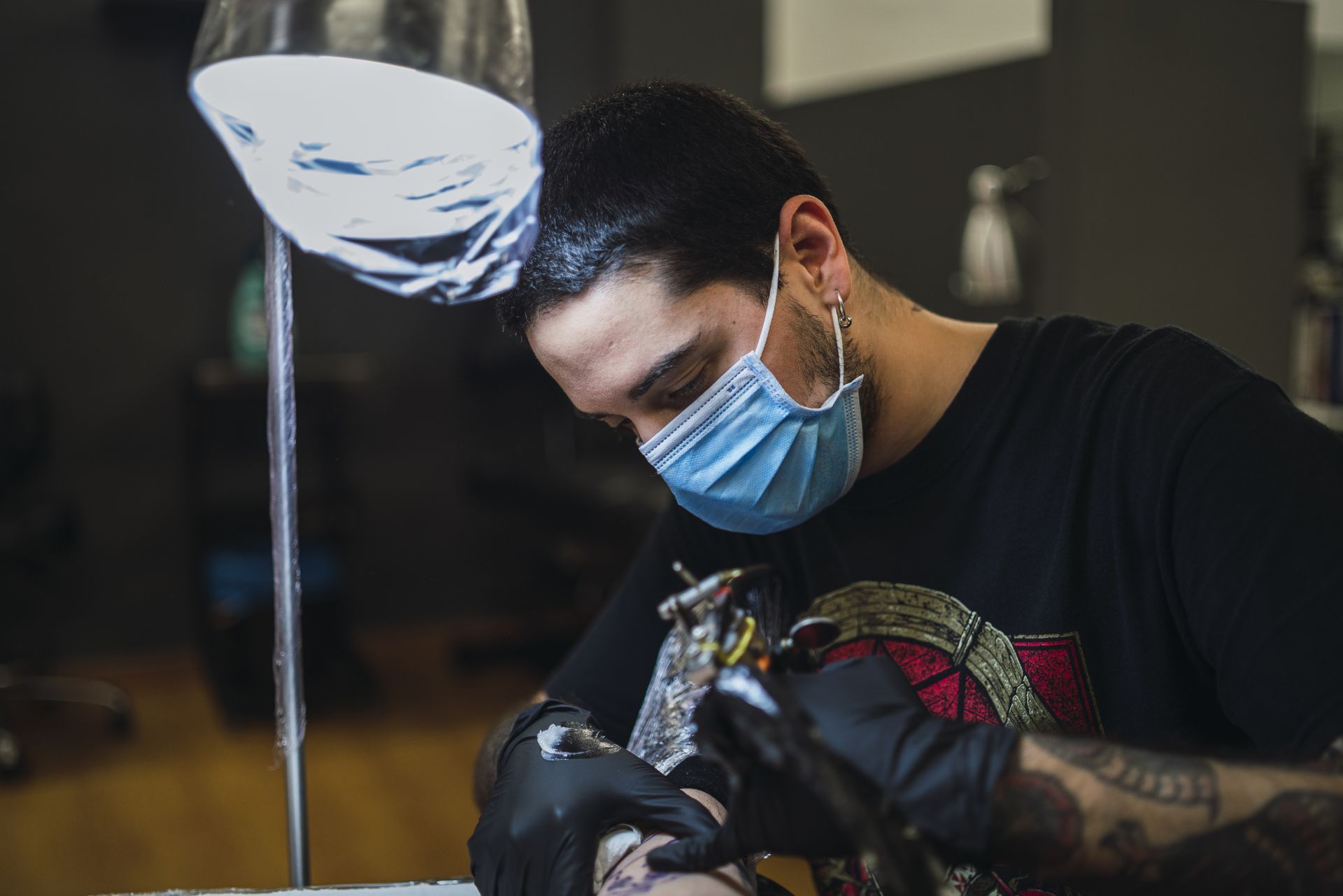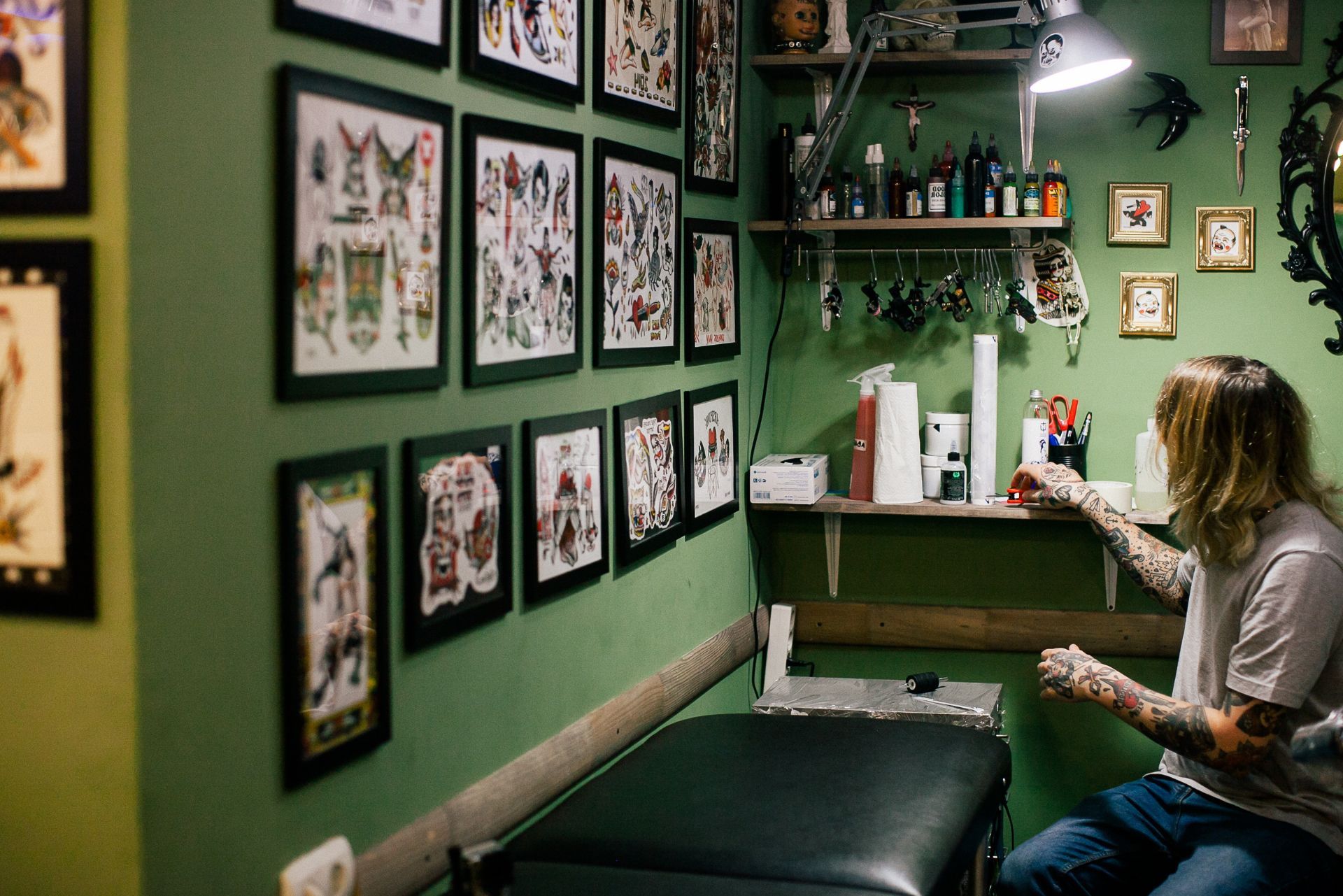Colorado Tattoo & Piercing Studio Insurance

8:30am - 5:00pm Mon-Fri
We'll Reply in 15min*
Index
Contact Us
Phone
303-421-5123
Location
9035 Wadsworth Parkway
Suite 2730B
Westminster, CO 80021
Operating a tattoo and piercing studio in Colorado can be an exciting venture, filled with creativity and the opportunity to express individuality. However, like any business, it comes with its own set of risks. Understanding the importance of insurance is crucial for protecting your studio, your employees, and your clients. This article will delve into the various aspects of tattoo and piercing studio insurance, helping you make informed decisions for your business.
Understanding the Basics of Tattoo and Piercing Studio Insurance
Insurance for tattoo and piercing studios is designed to protect against a range of potential liabilities. From bodily injury to property damage, having the right coverage can safeguard your business from financial ruin. Here, we will explore the fundamental types of insurance relevant to tattoo and piercing studios.
General Liability Insurance
General liability insurance is a must-have for any tattoo and piercing studio. This type of insurance covers claims related to bodily injury, property damage, and personal injury that may occur on your premises. For instance, if a client slips and falls while in your studio, general liability insurance can help cover medical expenses and legal fees.
Moreover, this insurance can also protect against claims of defamation or invasion of privacy, which can be particularly relevant in a creative environment where personal expression is paramount. It’s essential to assess the coverage limits to ensure they align with the potential risks your studio may face. Additionally, consider the unique nature of your clientele; for example, if you cater to a younger demographic, the likelihood of accidents may increase, necessitating higher coverage limits to mitigate potential risks.
Professional Liability Insurance
Professional liability insurance, often referred to as errors and omissions insurance, is another critical component for tattoo and piercing studios. This coverage protects against claims of negligence or malpractice that may arise from your services. For example, if a client develops an infection due to improper aftercare advice, they may file a lawsuit against your studio.
This insurance is particularly important for artists who provide advice on aftercare or who may be involved in more intricate procedures. Having this coverage can provide peace of mind, knowing that you are protected against claims that could jeopardize your business. Furthermore, as the tattoo and piercing industry evolves, so too do the techniques and tools used; staying updated on best practices and ensuring your insurance reflects these changes is crucial in maintaining your studio’s reputation and financial stability.
Property Insurance
Property insurance is vital for safeguarding the physical assets of your studio. This includes coverage for your equipment, furniture, and the building itself if you own it. In the event of theft, fire, or natural disasters, property insurance can help you recover the costs associated with replacing or repairing your assets.
It’s important to conduct a thorough inventory of your studio’s assets to determine the appropriate coverage amount. Additionally, consider whether you need coverage for business interruption, which can compensate for lost income during the time your studio is closed for repairs. Beyond just physical assets, property insurance can also extend to cover loss of income due to unforeseen circumstances, such as a pandemic or other emergencies that may force your studio to temporarily shut its doors. This aspect of property insurance can be a lifeline, ensuring that you can continue to meet your financial obligations even when your business is not operational.

While general liability, professional liability, and property insurance are the cornerstones of tattoo and piercing studio insurance, there are additional coverage options worth considering. These can provide further protection tailored to the unique needs of your business.
Workers' Compensation Insurance
If your studio employs artists or support staff, workers' compensation insurance is essential. This insurance covers medical expenses and lost wages for employees who are injured on the job. In the tattoo industry, where artists are often on their feet for long hours and using sharp tools, the risk of injury is higher.
Workers' compensation insurance not only protects your employees but also shields your business from potential lawsuits related to workplace injuries. In Colorado, this insurance is required for businesses with employees, making it a legal necessity as well. Additionally, fostering a safe work environment can help reduce the likelihood of accidents, which in turn can lead to lower insurance premiums over time. Regular safety training and equipment maintenance are proactive steps that can benefit both your staff and your bottom line.
Business Interruption Insurance
Business interruption insurance can be a lifesaver in the event of unforeseen circumstances that force your studio to close temporarily. This coverage can help replace lost income and cover ongoing expenses, such as rent and utilities, during the downtime.
For tattoo and piercing studios, where a significant portion of income comes from walk-in clients and appointments, this insurance can help stabilize your finances during challenging times. It’s advisable to review the terms carefully to understand what situations are covered. For instance, if a natural disaster or a fire disrupts your operations, this coverage can be crucial in maintaining your cash flow. Moreover, some policies may also include provisions for extra expenses, allowing you to pay for temporary relocation or additional marketing efforts to attract clients once you reopen.
Equipment Insurance
As a tattoo artist, your equipment is one of your most valuable assets. Equipment insurance provides coverage for the tools and machines used in your practice, including tattoo machines, sterilization equipment, and furniture. If your equipment is damaged or stolen, this insurance can help cover repair or replacement costs.
When considering equipment insurance, it’s important to document your assets thoroughly. Keeping receipts and maintaining an updated inventory can facilitate the claims process should the need arise. Additionally, investing in high-quality equipment and regular maintenance can extend the lifespan of your tools, potentially lowering your insurance premiums. Some policies may even offer coverage for loss of income due to equipment failure, ensuring that your business remains resilient in the face of unexpected challenges. This added layer of protection can give you peace of mind, allowing you to focus on your artistry rather than the risks associated with your equipment.
Choosing the Right Insurance Provider
Finding the right insurance provider is crucial for ensuring that your tattoo and piercing studio is adequately protected. With numerous options available, it's essential to conduct thorough research and consider several factors before making a decision.
Assessing Coverage Options
When evaluating insurance providers, assess the coverage options they offer. Look for policies that specifically cater to tattoo and piercing studios, as these will be more tailored to your unique risks. Ensure that the provider allows customization of coverage to meet your specific needs.
Additionally, inquire about any exclusions or limitations in the policy. Understanding what is not covered is just as important as knowing what is included, as it can prevent unpleasant surprises in the event of a claim. For instance, some policies may not cover bodily injury claims related to allergic reactions to ink or equipment malfunctions, which could be critical for your studio's operations. It’s advisable to discuss potential scenarios with your insurance agent to ensure that you have a comprehensive understanding of your coverage.
Evaluating Customer Service
Customer service is another critical factor to consider when choosing an insurance provider. A responsive and knowledgeable insurance agent can make a significant difference in your experience, especially during the claims process. Look for providers with positive reviews and a reputation for excellent customer service.
It may be beneficial to schedule consultations with potential providers to discuss your specific needs and gauge their responsiveness. A good insurance agent should take the time to understand your business and provide personalized recommendations. Additionally, consider how the provider handles claims—do they have a streamlined process? Are there dedicated claims representatives? These aspects can significantly impact your experience when you need to file a claim, especially in stressful situations where your business may be at risk.
Comparing Costs
While cost should not be the sole determining factor in choosing an insurance provider, it is an important consideration. Obtain quotes from multiple providers to compare premiums, deductibles, and coverage limits. Remember that the cheapest option may not always provide the best coverage.
Consider the value of the coverage offered in relation to the cost. Investing in comprehensive insurance can save you money in the long run by protecting your business from significant financial losses. Additionally, some providers may offer discounts for bundling multiple policies or for maintaining a claims-free record, which can further enhance the affordability of your coverage. It’s worthwhile to ask about any potential savings opportunities that could help you manage your insurance costs effectively.
Legal Requirements for Tattoo and Piercing Studios in Colorado
In Colorado, tattoo and piercing studios must adhere to specific legal requirements to operate legally. Understanding these regulations is essential for compliance and can also impact your insurance needs.
Licensing and Permits
Before opening a tattoo or piercing studio in Colorado, it is necessary to obtain the appropriate licenses and permits. This includes a tattoo establishment license issued by the Colorado Department of Public Health and Environment. Additionally, individual artists must hold a valid tattoo artist license.
Compliance with health and safety regulations is crucial, as failure to do so can result in fines or even the closure of your business. Insurance providers may also consider your compliance status when determining coverage and premiums. It’s also worth noting that the application process for these licenses can be quite detailed, often requiring proof of training and experience, as well as background checks to ensure the safety of clients. New studio owners should be prepared for a thorough review process, which can take several weeks or even months depending on the volume of applications being processed.
Health and Safety Standards
Colorado has specific health and safety standards that tattoo and piercing studios must follow. This includes maintaining a clean and sterile environment, using single-use needles, and adhering to proper aftercare protocols. Regular inspections may be conducted by health officials to ensure compliance.
Insurance providers may require proof of compliance with these standards as part of the underwriting process. Keeping detailed records of your studio's health and safety practices can be beneficial in this regard. Additionally, studios should invest in ongoing training for their staff to stay updated on the latest health regulations and best practices. This not only helps in maintaining compliance but also builds trust with clients who are increasingly aware of hygiene and safety concerns in personal care services. Regularly scheduled training sessions can also foster a culture of safety and professionalism within the studio.
Liability Waivers
While not a substitute for insurance, liability waivers can provide an additional layer of protection for your studio. Having clients sign a waiver before receiving services can help mitigate the risk of legal claims. However, it’s important to note that waivers may not hold up in court in all situations, so they should not be relied upon solely.
Consulting with a legal professional to draft a comprehensive waiver tailored to your studio's services can ensure that it meets legal standards and effectively protects your business. Additionally, it’s advisable to clearly communicate the contents of the waiver to clients, ensuring they understand what they are signing. This transparency can help build rapport and trust, making clients feel more comfortable and secure in their decision to receive services at your studio. Furthermore, maintaining an open dialogue about potential risks associated with tattooing and piercing can enhance client satisfaction and promote a responsible approach to body art.

Claims Process: What to Expect
Understanding the claims process is essential for tattoo and piercing studio owners. Knowing how to navigate this process can make a significant difference in the event of an incident.
Reporting an Incident
If an incident occurs that may lead to a claim, the first step is to report it to your insurance provider as soon as possible. Document the details of the incident, including dates, times, and any witnesses. This information will be crucial when filing a claim.
Most insurance providers have specific procedures for reporting claims, so familiarize yourself with these processes. Prompt reporting can expedite the claims process and ensure that you receive the necessary support.
Documentation and Evidence
Gathering documentation and evidence is a critical part of the claims process. This may include photographs of the incident, medical records, and any correspondence related to the claim. The more thorough your documentation, the stronger your claim will be.
Insurance adjusters will review the evidence you provide, so it’s essential to be organized and detailed in your submissions. Keeping a dedicated file for claims-related documents can help streamline this process.
Understanding the Outcome
Once your claim has been submitted, the insurance provider will conduct an investigation to determine the validity of the claim. This may involve interviews, site visits, and reviews of your documentation. Be prepared to cooperate fully during this process.
The outcome of the claim will be communicated to you, along with any next steps. If the claim is approved, the insurance provider will outline the compensation process. If denied, you have the right to appeal the decision, and understanding the reasons for denial can help you strengthen your case for reconsideration.
Conclusion: Protecting Your Tattoo and Piercing Studio
Insurance is a vital aspect of running a successful tattoo and piercing studio in Colorado. By understanding the various types of coverage available, the legal requirements, and the claims process, studio owners can make informed decisions that protect their businesses and clients.
Investing in comprehensive insurance not only safeguards against financial loss but also enhances the credibility of your studio. Clients are more likely to choose a studio that demonstrates a commitment to safety and professionalism. As the tattoo industry continues to grow, ensuring that your studio is adequately protected will allow you to focus on what you do best: creating art and helping clients express their individuality.
In the ever-evolving landscape of the tattoo and piercing industry, staying informed about insurance options and legal requirements is essential. By prioritizing protection and compliance, tattoo and piercing studio owners can thrive in this dynamic and rewarding field.




